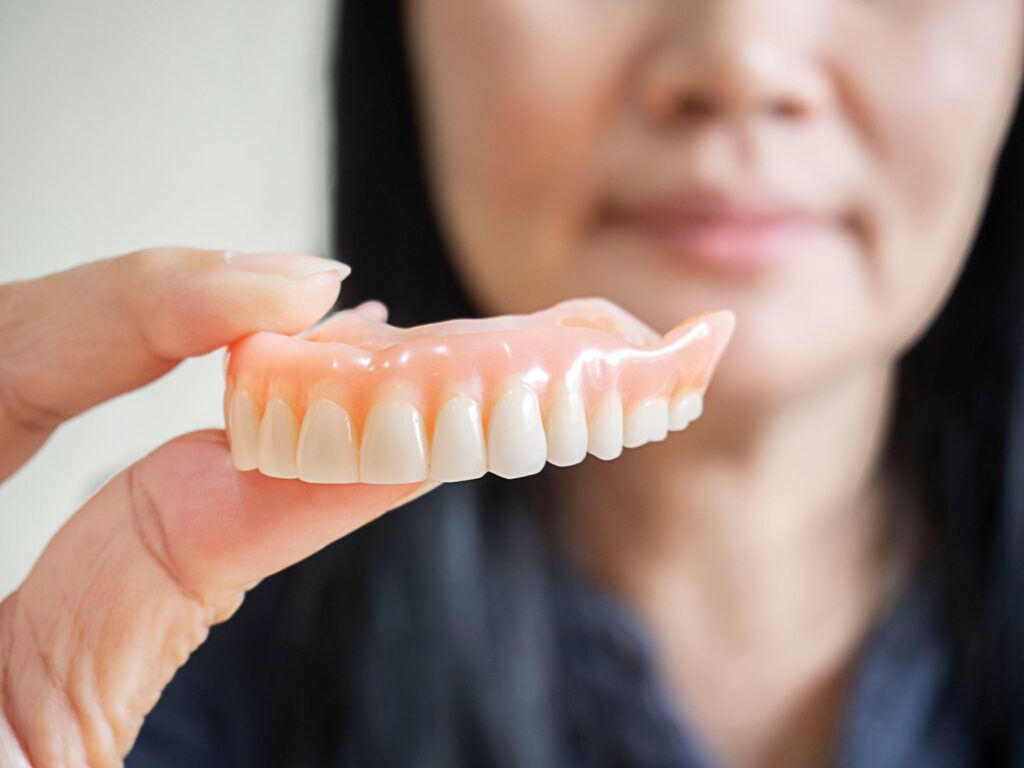
Gaps in your grin make once-basic tasks like eating, speaking, and smiling confidently much more challenging. Thankfully, your dentist can refurbish your smile with customized dentures made to look just like your natural pearly whites.
However, it can take about a month for your tongue, gums, and tender tissues in your mouth to adjust to the presence of your restoration. Many patients develop blisters during this transition that make wearing their new teeth uncomfortable. Continue reading to learn 3 ways to address denture sores so they don’t detract from your quality of life!
Method #1: Maintain Your Daily Routine
Many people incorrectly assume that they no longer need to be concerned with a daily dental hygiene routine if they have lost all their permanent teeth. The truth is that you can still develop gum disease, which can spread to and erode your jawbone if left unaddressed. This can lead to ill-fitting or destabilized dentures that don’t function as intended.
To prevent this from happening, you should remove your new teeth morning and night to thoroughly brush and floss them. You can use a soft-bristled toothbrush and mild dish soap rather than traditional toothpaste, which can be overly abrasive to your prosthetics. Be sure to also gently scrub your gums before rinsing your dentures off to reinsert them.
Method #2: Try a Salt Water Rinse
Did you know that salt acts as a natural disinfectant and anti-inflammatory? This commonly found ingredient draws water out of bacteria that contribute to oral issues like gum disease and tooth decay, interrupting their functionality. This, in turn, reduces swelling and aches associated with tender or injured connective tissues.
If your blisters hurt too much to wear your prosthetics, you can try mixing 1/3 tsp of salt into an 8-oz glass of warm water. Sip the solution and swirl it around your mouth for about 15 to 30 seconds before spitting it out. Repeat until your cup is empty for a reprieve from denture sores.
Method #3: Take a Break at Night
You might think it’s easier and simpler to sleep with your dentures in your mouth at night, but your dentist doesn’t recommend it. Your new teeth must form a firm suction against your gums to remain put all day long, which reduces their blood circulation. As a result, your body can’t deliver essential nutrients or infection-fighting cells to your teeth and gums, increasing the likelihood of developing gum disease.
It’s better to leave your restoration in a glass of cool water or a special soaking solution to maintain its shape while killing up to 99% of unwanted germs so you can rest without worry.
Most people fully acclimate to their dentures within two to four weeks. However, if you experience prolonged or persistent aches or blisters, you should call your dentist so they can check that your prosthetics fit as intended!
About the Practice
Families near Newark have trusted the team at White Clay Dental Associates with their smiles for 50+ years. Today, Dr. Bond and Dr. Ganfield work together to provide a comprehensive array of services to people of all ages, including dentures. They take the time to establish relationships with patients to tailor treatment plans to meet their unique needs. Then, they utilize state-of-the-art equipment to deliver accurate results meant to last. They can close spaces in your smile with durable, lifelike restorations fully customized to look and feel like the teeth that went missing. You can request an appointment on the website or call (302) 731-4225.
